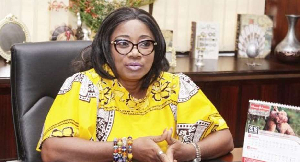... Vodafone deal backfires -Gov't warns critics
The Minister of Communication, Mr. Aggrey Ntim, has warned that Ghana Telecom (GT) faces imminent collapse if immediate action is not taken to salvage the numerous problems facing the company at present.
He said, as at December last year, total assets of GT was GH¢531 million as against its total liabilities of GH¢558 million, giving a net worth value of GH¢27 million. He noted that as at May this year, total assets of the company stood at GH¢552 million against total liabilities of GH¢586 million, resulting in a net worth figure of GH¢34 million.
According to the Minister, the working capital of the company follows a similar trend, and last year it recorded a negative working capital of GH¢188 million and as at May, this year, the figure rose to GH¢199 million.
The situation, he noted, was a great worry to Government, saying “given the current competitive market forces at play in the country, and the negative balance sheet status of GT, it is unlikely to see GT remain competitive over any appreciable length of time, before the factors that give premium consideration to its value is eroded.” The Minister was speaking at a news conference in Accra yesterday, to make known to the public the rationale behind the government’s decision to sell 70% shares in GT to Vodafone International Holdings BV.
He stated that GT was currently constrained to the extent that it was performing against revenue expectation with no profit declared. Its network rollout was also behind target.
He lamented that GT built only 20% of its projected 400 sites because of lack of investment funds, while as at December last year, MTN had 1,660, TIGO 702 and One Toch 397 base stations. In the same year, GT’s capital expenditure was US$31 million instead of the required US$67 million to sustain business strategy, while MTN spent US$164 million.
He mentioned that the cumulative capital expenditure for the next eight to twelve months is US$271 million, and cumulative for five years is US$500 million, which is the value of CAPEX that Vodafone is committed to provide under the Sales and Purchase Agreement (SPA).
“GT Mobile Network capacity is 1.8 million subscribers with a current subscriber base of 11.4 million. This shortfall is again due to lack of adequate investment and GT fixed line capacity is 477,000 with a current subscriber base of 350,000.”
He pointed out that in the absence of expanded capacity, GT’s asset base will continue to depreciate while its competitors in the industry take over GT’s market share.
Mr. Ntim said it was in view of the above that “Government has taken the bold step to privatise GT”, and also because “it is in line with its policy of privatisation and liberalisation designed to make the private sector the engine of growth.” This, he noted would create opportunity for government to partner the private sector to re-capitalise the company to the tune of US$500 million, to bring about innovation in its operations, saying “Government would thereby be freed to apply revenue accruing to the state to meet cost of other social responsibilities.”
He stressed that the major policy objective of Government seeks to support the policy of Telecommunications Market Liberalisation to improve upon the deployment of Information Communication Technology (ICT) infrastructure, to facilitate the socio-economic growth of the country.
According to him, “we are particularly challenged to pursue visionary Telecom Liberalisation Policy to aid the development of an open and competitive telecom market, so that universal access to telecommunications can be a reality in Ghana.”
He explained that the privatisation of GT started in 1997 when Telecom Malaysia (TMB) paid US$38 million to acquire 30% share in GT, but failed to pay any dividend for a period of five years that they served as strategic investment.
He said, in May last year, an Inter-Ministerial Committee appointed Ecobank Development Corporation as Transactions Advisor (TA) to undertake the GT privatisation exercise. In furtherance of the process, the TA in July the same year, advertised locally and internationally, to invite strategic investors to submit their expression of interest to which seventeen companies, including Portugal Telecom, France Telecom, Vodafone, Vodacom and Telecom S.A responded.
The above companies were short listed and submitted final offers of US$84 million, US$520 million and US$346 million by Portugal Telecom, France Telecom and Vodacom respectively for 66.67% bid offer and in the same order offered US$547 million, US$213.8 million and US$699.3 million respectively, for capital expenditure to be invested in GT (CAPEX).
These offers, government considered unsatisfactory and so the TA in December last year ended the period of exclusivity for the three companies, the Minister said.
Subsequently, Telecom South Africa made an offer of US$658 million for 66.67% of equity stake in GT, based on their assumption that the enterprise value of GT was US$1,216 million and a net debt of US$230 million, which was considered lower than government’s expectation, he revealed.
Mr. Ntim continued that in February 2008, Vodafone also showed interest and made initial proposals based on Headline Enterprise Value for GT at US$1.5 billion, which is US$667 million for 66.67% of equity stake in GT, US$700 million and US$800 million for 70% and 80% of equity stake respectively in GT.
However in May 2008, following negotiations on Vodafone’s bid proposals submitted in February, government received an updated offer from the former to acquire 70% interest in GT, for a total consideration of US$900 million on a debt-free, cash-free basis, he stated.
According to him, “this offer corresponds to an Enterprise Value of US$1,128 million for 100% of GT”, and argued that considering the high indebtedness of GT and the deteriorating circumstances of the state company, “the declining valuation figures necessitated the aggregation of other state communications infrastructure that also required investment to build. This is why consideration was given to the transfer and management of the National Communications Backbone in this offer.”
Further, he disclosed that the final draft SPA has given consideration that includes measures required to commit Vodafone to complete the second phase of the fibre optic backbone, while all the major competitors to GT were building their fibber optic network in the country.
“The fibre optic backbone would be maintained as an open access, non discriminatory network and the subsidiary management company to be considered in the new GT, would include Government partnership to enable its open access character to be monitored at all times”, he added. He debunked suggestions that Vodafone is a ‘mobile only’ network, saying, “they have been investing in fixed line and broadband services for sometime now and they are rated 5th in Europe”, among others.
On the interest of labour, he indicated that the Govenmmrnt of Ghana (GoG) and Vodafone were committed to protecting the job security and welfare of all employees, stressing, “the commitment of GoG is demonstrated in the SPA to ensure that the new GT will be free from all debts.”
By this, GoG will ringfence all debts so the investment of US$500 million to be made into GT would be applied solely to promote expansion of GT in addition to a proposal in the SPA for GT to be listed on the Stock Exchange from 2010. He maintained that “from the points I have enumerated on GT’s financial situation, if no action is taken now, we stand to face the unfortunate situation of making these workers redundant. This is the reason why government is taking steps to protect the interest of the workers.”
Stressing that the transaction process has been open and transparent, he said “the transaction has been submitted for the consideration of Parliament in accordance with Article 181of the 1992 constitution of Ghana. This has given the opportunity for the people of Ghana, acting through their elected representatives too make valuable inputs into the SPA.” The Minority spokesman on Communication, Haruna Idrissu has meanwhile told Joy FM that government failed to inform others bidders of the company that it was adding the fibre optic section to the sale. He noted that if the government had disclosed this essential information, those who put in low bids would have increased it. According to the Tamale South Legislator, the non-disclosure of this vital information breached the procurement law.
He further argued that based on the information put in the public domain by the Minister for Communication, government would only get $400m from the sale of the GT and not $900m as being claimed. The National Democratic Congress running mate, John Mahama, who spoke on the same radio station earlier, noted that if the government had sold Onetouch and the Fibre optic separately, it would have made more money than the $900 million sale price.
Click to view details



Business News of Wednesday, 30 July 2008
Source: chronicle
















